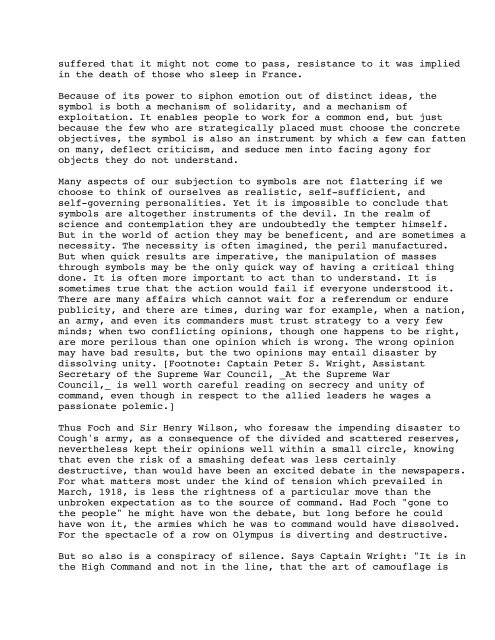PUBLIC OPINION by WALTER LIPPMANN TO FAYE LIPPMANN ...
PUBLIC OPINION by WALTER LIPPMANN TO FAYE LIPPMANN ...
PUBLIC OPINION by WALTER LIPPMANN TO FAYE LIPPMANN ...
You also want an ePaper? Increase the reach of your titles
YUMPU automatically turns print PDFs into web optimized ePapers that Google loves.
suffered that it might not come to pass, resistance to it was implied<br />
in the death of those who sleep in France.<br />
Because of its power to siphon emotion out of distinct ideas, the<br />
symbol is both a mechanism of solidarity, and a mechanism of<br />
exploitation. It enables people to work for a common end, but just<br />
because the few who are strategically placed must choose the concrete<br />
objectives, the symbol is also an instrument <strong>by</strong> which a few can fatten<br />
on many, deflect criticism, and seduce men into facing agony for<br />
objects they do not understand.<br />
Many aspects of our subjection to symbols are not flattering if we<br />
choose to think of ourselves as realistic, self-sufficient, and<br />
self-governing personalities. Yet it is impossible to conclude that<br />
symbols are altogether instruments of the devil. In the realm of<br />
science and contemplation they are undoubtedly the tempter himself.<br />
But in the world of action they may be beneficent, and are sometimes a<br />
necessity. The necessity is often imagined, the peril manufactured.<br />
But when quick results are imperative, the manipulation of masses<br />
through symbols may be the only quick way of having a critical thing<br />
done. It is often more important to act than to understand. It is<br />
sometimes true that the action would fail if everyone understood it.<br />
There are many affairs which cannot wait for a referendum or endure<br />
publicity, and there are times, during war for example, when a nation,<br />
an army, and even its commanders must trust strategy to a very few<br />
minds; when two conflicting opinions, though one happens to be right,<br />
are more perilous than one opinion which is wrong. The wrong opinion<br />
may have bad results, but the two opinions may entail disaster <strong>by</strong><br />
dissolving unity. [Footnote: Captain Peter S. Wright, Assistant<br />
Secretary of the Supreme War Council, _At the Supreme War<br />
Council,_ is well worth careful reading on secrecy and unity of<br />
command, even though in respect to the allied leaders he wages a<br />
passionate polemic.]<br />
Thus Foch and Sir Henry Wilson, who foresaw the impending disaster to<br />
Cough's army, as a consequence of the divided and scattered reserves,<br />
nevertheless kept their opinions well within a small circle, knowing<br />
that even the risk of a smashing defeat was less certainly<br />
destructive, than would have been an excited debate in the newspapers.<br />
For what matters most under the kind of tension which prevailed in<br />
March, 1918, is less the rightness of a particular move than the<br />
unbroken expectation as to the source of command. Had Foch "gone to<br />
the people" he might have won the debate, but long before he could<br />
have won it, the armies which he was to command would have dissolved.<br />
For the spectacle of a row on Olympus is diverting and destructive.<br />
But so also is a conspiracy of silence. Says Captain Wright: "It is in<br />
the High Command and not in the line, that the art of camouflage is





